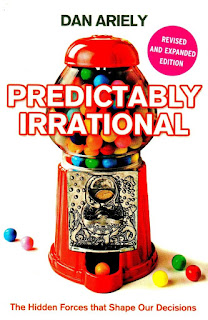It has been quite a while
now that I have come to the conclusion that we humans are not the
rational, noble, sensible and sane species that we have been thinking of
ourselves to be. While my opinion happens to have had its genesis in
watching my fellow humans driving their vehicles, skipping the queues
and behave in dumb ways wherever and whenever they can, Dan Ariely seems
to have done a study about it in a proper, unbiased and academic way.
This is my second read of Dan's books and I can't help feeling a sense of déjà vu going throughout the book. Dan Ariely runs most of his experiments in a controlled environment - almost all the participants in most of the experiments are students who have been informed well in advance that they are taking part in an experiment. Sometimes, I wonder whether he conducts the experiments to find the truth or to affirm his pre-concluded notions.
A major part of the latter half of the book feels like you have landed in his other book 'The (Honest) Truth About Dishonesty', through some secret portal inside the paper. Repetition of his previous ideas and experiments, along with the controlled and simple nature of experiments - where he conducts experiments with his students and concludes that the uncontrolled animals that we are in the real world will also behave like those students - spoil the fun.
I can give this book somewhere between two and three stars. May be, 2.5?! Not sure!
This is my second read of Dan's books and I can't help feeling a sense of déjà vu going throughout the book. Dan Ariely runs most of his experiments in a controlled environment - almost all the participants in most of the experiments are students who have been informed well in advance that they are taking part in an experiment. Sometimes, I wonder whether he conducts the experiments to find the truth or to affirm his pre-concluded notions.
A major part of the latter half of the book feels like you have landed in his other book 'The (Honest) Truth About Dishonesty', through some secret portal inside the paper. Repetition of his previous ideas and experiments, along with the controlled and simple nature of experiments - where he conducts experiments with his students and concludes that the uncontrolled animals that we are in the real world will also behave like those students - spoil the fun.
I can give this book somewhere between two and three stars. May be, 2.5?! Not sure!






